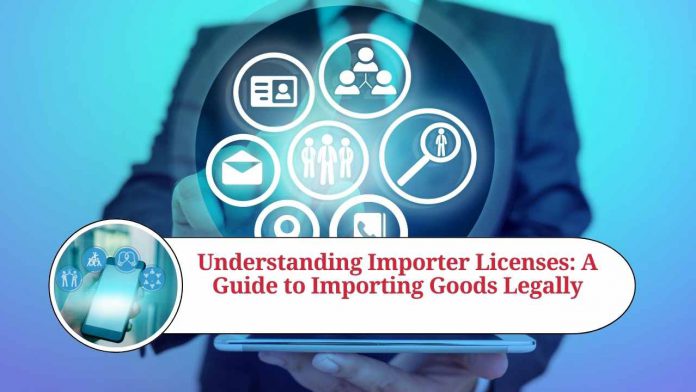Importing goods from foreign countries can be a lucrative business opportunity. However, before you can start importing goods, you’ll need to obtain an importer license. An importer license is a document that grants individuals or companies the legal right to import goods into a particular country. In this blog post, we will cover everything you need to know about importer licenses, including the application process, the requirements, and the benefits of having an importer license.
What is an Importer License?
An importer license, also known as an import license, is a legal document that allows an individual or company to import goods into a particular country. The purpose of an importer license is to regulate the import of goods and ensure that they comply with the laws and regulations of the importing country.
Why do you need an Importer License?
Importing goods without an importer license is illegal in most countries. Therefore, if you want to import goods legally, you’ll need to obtain an importer license. In addition to being a legal requirement, having an importer license can also provide you with various benefits.
Benefits of having an Importer License
Having an importer license can provide you with various benefits, including:
- Access to a wider range of goods: With an importer license, you’ll have access to a wider range of goods from different countries. This can help you find unique products that can give you a competitive advantage.
- Increased profits: Importing goods can be a profitable business opportunity. With an importer license, you’ll be able to import goods legally and avoid any fines or penalties for importing goods illegally.
- Establishing relationships with foreign suppliers: Importing goods requires establishing relationships with foreign suppliers. Having an importer license can make it easier to establish these relationships and negotiate better prices.
- Contributing to the economy: Importing goods can also contribute to the economy by creating jobs, generating revenue, and promoting trade.
How to obtain an Importer License
The process of obtaining an importer license can vary depending on the country you’re importing goods into. However, the general process usually involves the following steps:
- Research the import regulations: The first step is to research the import regulations of the country you’re importing goods into. This will help you understand the requirements for obtaining an importer license and ensure that you comply with all the regulations.
- Apply for an importer license: Once you understand the import regulations, you can apply for an importer license. The application process typically involves filling out an application form and submitting it to the relevant government agency.
- Provide supporting documents: In addition to the application form, you’ll also need to provide supporting documents, such as a business license, tax ID number, and proof of financial stability.
- Wait for approval: After submitting the application and supporting documents, you’ll need to wait for approval from the relevant government agency. The approval process can take several weeks or months, depending on the country and the complexity of the application.
- Renew the license: Once you’ve obtained an importer license, you’ll need to renew it periodically to ensure that it remains valid.
Importing goods can be a complex process, and it’s important to understand the regulations and requirements involved. In addition to obtaining an importer license, you’ll also need to comply with various customs and trade regulations, such as import tariffs, product safety standards, and labeling requirements.
To ensure that you comply with these regulations, it’s important to work with experienced import/export professionals, such as freight forwarders, customs brokers, and trade consultants. These professionals can help you navigate the complex world of international trade and ensure that your goods are imported legally and efficiently.
It’s also important to conduct due diligence on your foreign suppliers to ensure that they are reputable and reliable. This includes verifying their business registration, checking their references, and conducting product inspections to ensure that the goods meet your quality standards.
In addition to the legal and regulatory requirements, importing goods also involves various logistical and financial considerations. For example, you’ll need to arrange for shipping, logistics, and insurance, as well as manage the financial risks associated with currency fluctuations and payment delays.
Conclusion
Overall, importing goods can be a rewarding business opportunity, but it’s important to approach it with caution and careful planning. By obtaining an importer license, working with experienced professionals, and conducting thorough due diligence, you can minimize your risks and maximize your chances of success in the global marketplace.
Read more useful content:
Frequently Asked Questions (FAQs)
What is an importer license?
An importer license is a legal document that grants individuals or companies the legal right to import goods into a particular country.
Do I need an importer license to import goods?
Yes, importing goods without an importer license is illegal in most countries. Therefore, if you want to import goods legally, you’ll need to obtain an importer license.
How do I obtain an importer license?
The process of obtaining an importer license can vary depending on the country you’re importing goods into. However, it usually involves filling out an application form, providing supporting documents, and waiting for approval from the relevant government agency.
What documents do I need to provide when applying for an importer license?
You’ll typically need to provide supporting documents such as a business license, tax ID number, and proof of financial stability.
How long does it take to obtain an importer license?
The approval process can take several weeks or months, depending on the country and the complexity of the application.
Do I need to renew my importer license?
Yes, you’ll need to renew your importer license periodically to ensure that it remains valid.
What are the benefits of having an importer license?
Having an importer license can provide you with various benefits, including access to a wider range of goods, increased profits, and establishing relationships with foreign suppliers.
Can I import any goods with an importer license?
There may be restrictions on the types of goods you can import, such as prohibited items or items that require special permits or licenses.
Do I need to pay import duties or taxes?
Yes, you may be required to pay import duties or taxes on the goods you import. The amount of duties and taxes can vary depending on the country and the type of goods being imported.
Can I import goods without an importer license?
Importing goods without an importer license is illegal in most countries and can result in fines, penalties, or even criminal charges. Therefore, it’s important to obtain an importer license before importing any goods.




















